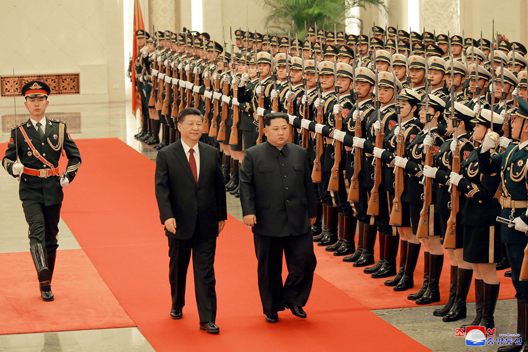 Though North Korean leader Kim Jong-un pledged his country’s commitment to denuclearization in a secret meeting with Chinese President Xi Jinping, it is unlikely that his sentiments are sincere.
Though North Korean leader Kim Jong-un pledged his country’s commitment to denuclearization in a secret meeting with Chinese President Xi Jinping, it is unlikely that his sentiments are sincere.
According to Jamie Metzl, a senior fellow at the Atlantic Council’s Scowcroft Center for Strategy and Security, North Korea will “almost certainly,” ultimately refuse to give up its nuclear weapons.
Kim secretly visited China in what was deemed an “unofficial visit” from March 25 to March 28. The meeting took place weeks ahead of a planned summit between North and South Korea and the looming possibility of a sit-down between Kim and US President Donald J. Trump.
According to North Korean officials, Kim said: “It is our consistent stand to be committed to denuclearization on the peninsula, in accordance with the will of late [North Korean] President Kim Il Sung and late [North Korean] General Secretary Kim Jong Il.”
However, he followed this announcement with a caveat. “The issue of denuclearization of the Korean peninsula can be resolved, if South Korea and the United States respond to our efforts with goodwill, create an atmosphere of peace and stability while taking progressive and synchronous measures for the realization of peace,” Kim said.
“North Korea has no intention of giving up its nuclear weapons without requiring a series of concession that would be unacceptable to the United States and South Korea,” said Metzl.
As reported by the New York Times, North Korea has begun to fire up a new nuclear reactor. Though Pyongyang claims it will produce electricity for civilian use, the reactor can create plutonium, a key ingredient in nuclear weapons.
Contrary to Kim’s statement, “the meeting between Xi Jinping and Kim Jong Un in Beijing demonstrates yet again how challenging it will be to get North Korea to give up its nuclear weapons,” said Metzl. The increased cooperation between Pyongyang and Beijing, he said, “makes clear the United States will fail in its efforts to drive this change without a far more coherent and comprehensive strategy.”
Pyongyang began testing nuclear weapons in August of 2017, and since then tensions with Washington and the rest of the international community have only skyrocketed. Escalatory rhetoric and a series of missile tests have brought the crisis to a boiling point. Thus far, both sides have refused to back down.
In response to North Korea’s aggressive nuclear activity, the United Nations Security Council slapped sanctions on the Kim regime. Washington has also pressured Beijing to exert more influence over its wayward ally. Following the meeting, Beijing stated it would uphold the UNSC sanctions and maintain economic pressure on North Korea.
However, that pressure does not assure Kim will stand by his statement to denuclearize. According to Metzl, “by rekindling ties between their two countries, Xi and Kim are signaling that the United States will not be able to pressure North Korea to change its ways on nuclear weapons.”
Consequently, Washington cannot count on Beijing to bring Pyongyang to heel in its nuclear activities.
Instead, tighter ties between China and North Korea close off options for the United States as it continues to pursue Pyongyang’s denuclearization. According to Metzl, if (though, more likely, when) North Korea reneges on its claim to denuclearize, the United States will not be able to use sanctions or military action to try to change North Korea’s behavior now that Beijing has Pyongyang’s back even more than before.” This leaves Trump in a precarious position ahead of his meeting with Kim.
“This visit and the revival of closer ties between North Korea and China have significantly reduced the Trump administration’s leverage over North Korea,” said Metzl.
He added that the renewal of relations between Pyongyang and Beijing, have further “strengthened Kim Jong-un’s hand in the potential summit meeting with Donald Trump, and made Trump’s improvisational decision to agree to such a meeting appear even more foolish.”
Rachel Ansley is assistant director for editorial content at the Atlantic Council.
Image: North Korean leader Kim Jong Un and Chinese President Xi Jinping inspect honor guards in Beijing, as he paid an unofficial visit to China, in this undated photo released by North Korea's Korean Central News Agency (KCNA) in Pyongyang March 28, 2018. (KCNA/via Reuters)
